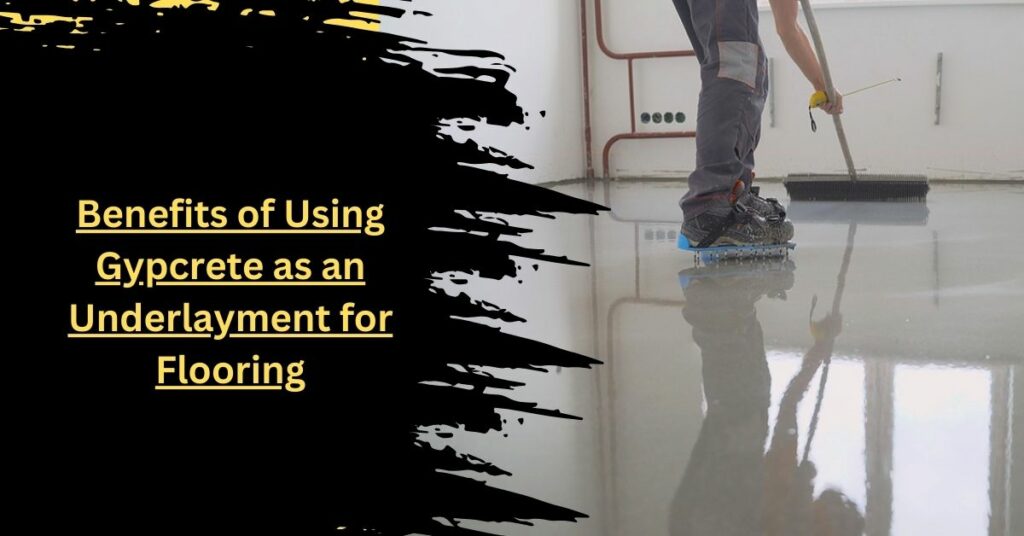Underlayments made from gypsum offer a versatile and lightweight solution for flooring in both commercial and residential settings. Gypcrete balances durability and ease of installation, making it a popular choice among contractors and homeowners.
The sound control feature of this underlayment also adds to its appeal and functionality. Here are the benefits of using a gypsum underlayment for flooring:
Sound Attenuation
Sound attenuation in buildings helps create comfortable, quiet living and working environments. It reduces noise transmission from one area to another. Gypcrete contributes to sound attenuation due to its dense composition. Its high density absorbs sound waves, reducing the noise transmitted through floors and walls. This makes it ideal for multi-level buildings, commercial spaces, and residential units.
The gypsum underlayment also passes the requirements for sound attenuation tests, making it a reliable option for controlling noise in high-traffic areas. It enhances the walls’ structural insulation properties, providing an acoustically efficient environment.
Sound attenuation allows occupants to enjoy better privacy and a more peaceful environment. Incorporating gypsum composition into construction projects helps meet building codes and standards that mandate specific levels of sound insulation.
Thermal Insulation
Thermal insulation helps maintain comfortable indoor temperatures and reduce energy consumption. A gypsum-based underlayment provides a natural thermal barrier, preventing heat loss through floors. This insulation feature is especially beneficial in colder climates, where it can significantly reduce heating costs.
The unique composition allows it to retain heat, creating a stable and comfortable indoor climate. Thermal insulation contributes to environmental sustainability by reducing the demand for heating and cooling systems. This, in turn, leads to lower carbon emissions and reduced energy costs.
Durable Solution
The resilience of gypsum underlayment makes it a durable solution for long-term use. It is resistant to impact and wear, preventing damage from heavy foot traffic and equipment. This makes it suitable for commercial or industrial spaces with high activity levels. Gypcrete is a reliable option for supporting heavy loads such as tiles, hardwood flooring, and carpeting.
The material composition promotes a stable and level surface, preventing cracks and unevenness in the flooring. It’s made to withstand extreme conditions, making it ideal for use in different environments with varying temperatures and humidity.
Gypsum is a composition of calcium sulfate and water, making it naturally resistant to mold and mildew. It offers a hygienic and healthy indoor environment. A vapor barrier can enhance its moisture resistance, making it ideal for basements and water-prone areas.
Easy Installation
The installation of gypsum as an underlayment for flooring is distinguished by its simplicity and efficiency. A specialized blend of gypsum cement and additives is mixed with water to the manufacturer’s specifications. This prepared mixture is then poured onto the substrate.
Due to its fluid consistency, Gypcrete naturally levels itself. It spreads evenly across the floor to fill low spots and create a uniformly flat surface without manual intervention. This self-leveling characteristic is particularly beneficial, negating the necessity for labor-intensive leveling.
The product has a shorter drying time compared to traditional cement-based underlayments. Professional installers use gypsum basements to speed up the process, making it an ideal choice for time-sensitive projects.
Fire Resistance and Safety
From a safety standpoint, Gypcrete-based underlayment is optimal for commercial spaces. This gypsum-based material inherently possesses excellent fire-resistant properties due to the natural composition of gypsum. It contains a significant amount of water, which helps to retard the spread of fire by acting as a barrier between the heat source and the combustible materials.
Gypsum releases steam from its water molecules during a fire, slowing the flame spread and enhancing fire safety in buildings. It does not emit fumes when exposed to high temperatures, making it safe for building occupants in case of a fire.
Revamp Your Space with Gypcrete
Gypcrete is a cost-effective and high-performing solution for preparing subfloors before installing various types of flooring. Its unique composition, ease of installation, and quick drying time make it a preferred choice for commercial and residential spaces. It provides a stable, durable surface that withstands heavy loads and extreme conditions.
Its mold and mildew-resistant properties also contribute to maintaining a hygienic and healthy indoor environment. Contact a professional installer today to explore the benefits and applications of gypsum in your next flooring project.
